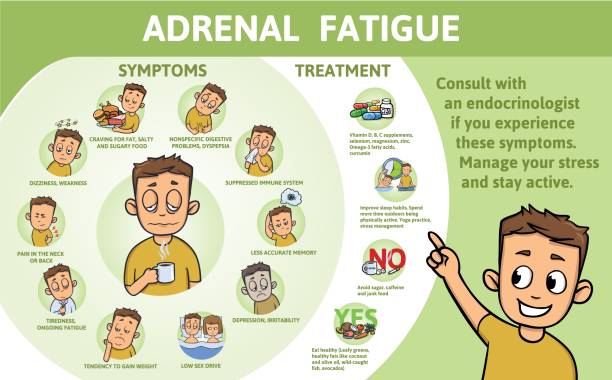Contents
Key Takeaways:
- Adrenal fatigue describes a set of nonspecific symptoms like exhaustion, food cravings, and poor sleep, which can take a real toll on quality of life.
- Although not an official medical diagnosis, many individuals seek relief through lifestyle adjustments and improved daily habits.
- Consistent sleep, stress reduction, balanced nutrition, and adequate hydration play crucial roles in enhancing energy and overall well-being.
Understanding Adrenal Fatigue
Adrenal fatigue commonly refers to a range of symptoms believed to stem from long-term stress wearing down the adrenal glands. While mainstream medical communities such as the Endocrine Society do not officially recognize adrenal fatigue as a diagnosable condition, the symptoms people experience—like persistent tiredness, cravings for salty or sweet foods, and difficulty waking up—are very real and disruptive. In some cases, individuals turn to adrenal fatigue treatments to attempt to restore their energy and balance. The term “adrenal fatigue” has gained popularity over the past few decades, often used by individuals seeking answers to their unexplained exhaustion and low motivation.
The primary concept is that prolonged stress can contribute to hormonal imbalances, affecting various aspects of your health, including your immune system, motivation, and focus. Many people with these symptoms also notice an increased reliance on caffeine, bouts of “brain fog,” and issues with mood regulation or concentration. Whether or not adrenal fatigue is a recognized diagnosis, these experiences are valid and often call for practical, supportive strategies. Chronic stress, if not properly managed, can affect sleep cycles, digestion, and even relationships, making it crucial to pay attention to these warning signs.
Despite the controversies in medicine, it’s important to rule out other health issues like thyroid disorders, anemia, or chronic fatigue syndrome, which share many symptoms with so-called adrenal fatigue. Working with a healthcare provider can help pinpoint the root causes of your symptoms. Self-diagnosis can be tempting, but only professional evaluation ensures nothing more serious is missed and that you receive accurate, individualized guidance for symptom relief.
As the body’s stress response system, the adrenal glands produce hormones like cortisol. Prolonged stress can disrupt this function, leading to the symptoms many people attribute to adrenal fatigue. When cortisol levels are consistently high or low, you may notice irritability, trouble sleeping, or difficulty concentrating. Over time, your body’s ability to bounce back from stress can weaken, adding to the sensation of never feeling truly rested.
For further reading on approaches to regaining energy and managing stress-related fatigue, consult this in-depth resource on Healthline. Being well-informed is key to making choices about your health that align with current science and your life circumstances.
Smart Habits to Enhance Energy Levels
While debates around adrenal fatigue persist, the following lifestyle habits support healthy energy levels and resilience to stress, whether or not you believe in the specific diagnosis. Adopting these practices can create a strong foundation for your overall well-being and make a significant difference in how you experience daily life.
1. Prioritize Quality Sleep
Sleep is foundational—without enough rest, every system in your body, including your stress response and immune system, can become compromised. Aim for seven to nine hours of uninterrupted rest each night. Creating a restful environment, adhering to a regular sleep-wake schedule, and avoiding stimulants such as caffeine or electronics before bed can significantly improve sleep quality. According to the Sleep Foundation, optimizing bedroom environment and practicing good sleep hygiene can make a remarkable difference. If you struggle to wind down, consider soothing activities before bed, such as gentle stretching, herbal tea, or calming music. Remember, good sleep isn’t just about quantity—it’s about consistency and quality, and these simple tweaks can help you wake up feeling genuinely refreshed instead of groggy.
2. Manage Stress Effectively
Persistent stress keeps your body in a fight-or-flight mode, depleting mental energy and taxing the adrenal glands even further. Daily practices like meditation, journaling, breathwork, or yoga can help activate the body’s relaxation response, making it easier to handle challenges and recover. Even ten minutes a day of mindfulness or gentle movement provides measurable reductions in stress. For those who struggle with anxiety or racing thoughts, techniques such as progressive muscle relaxation or guided visualization can be particularly soothing. Integrating these habits into your routine not only supports your energy but also boosts emotional resilience over time, making daily hassles feel more manageable.
3. Maintain a Balanced Diet
Proper nutrition fuels your body for optimal hormone production and steady energy throughout the day. Focus on whole foods—lean proteins, healthy fats, nuts, leafy greens, and seasonal fruits. Minimize your intake of processed foods, sugars, and unhealthy fats, as these can cause energy spikes and crashes. Eating a colorful variety of fruits and vegetables ensures you receive essential vitamins and minerals, supporting adrenal and overall health. If you have food sensitivities or allergies, working with a nutritionist can make customizing your diet easier and more effective. Eating mindfully and savoring each meal also contributes to better digestion and a more balanced mood.
4. Engage in Moderate Exercise
While intense workouts can be stressful for those with fatigue, moderate exercises like walking, swimming, or gentle yoga can boost circulation, endorphin levels, and overall stamina. Importantly, listen to your body and allow adequate recovery, especially if you’re already feeling run down. Exercise doesn’t have to mean hours at the gym; short, regular sessions of movement can offer remarkable benefits for both physical and mental energy. Mixing in activities you enjoy—whether stretching outdoors or dancing—makes it more likely you’ll stick with it and reap the rewards over the long term.
5. Stay Hydrated
Water is essential for every metabolic process, including hormone regulation. Dehydration often exacerbates fatigue, headaches, and muscle cramps. Aim to drink water regularly throughout the day—sometimes fatigue is simply a sign of inadequate hydration. Herbal teas, infused water, or water-rich foods like cucumbers and melons contribute to your daily intake. Developing a habit of keeping a water bottle nearby can be the simplest way to ensure you’re drinking enough. If you exercise frequently or live in a hot climate, increase your intake to match your needs.
6. Limit Stimulant Intake
Caffeine, energy drinks, and sugar provide short-lived boosts but can worsen the cycle of fatigue. Excess stimulants strain the adrenal glands and disrupt natural energy rhythms. Gradually reduce your reliance on caffeine and experiment with herbal teas or natural alternatives. Notice how your body responds when you lower your intake—many people report steadier focus and fewer crashes. Pay attention to labels on snacks or beverages, as hidden sources of caffeine or added sugars can sneak into your day.
7. Establish Regular Meal Patterns
Eating regular, balanced meals and healthy snacks keeps blood sugar steady and helps avoid energy crashes. Skipping meals or rushing through food can increase cravings and intensify feelings of fatigue. Try meal planning and mindful eating to keep your body nourished and your mood level. Starting your day with a nutritious breakfast sets the tone for stable energy, while evening meals that are too heavy or loaded with sugar can impact sleep. Experiment with different meal timing and ingredients to discover what works best for you.
8. Seek Professional Guidance
If your fatigue is severe, persistent, or accompanied by other symptoms like weight loss, dizziness, or mood changes, consult a healthcare professional. They can help identify any underlying medical conditions and tailor lifestyle recommendations to your specific needs. Tracking your symptoms in a journal can be helpful when sharing them with your provider, as it offers insights into possible triggers or improvements over time. Individualized support makes it easier to navigate confusing or persistent health issues, ensuring you don’t carry the burden alone.
Conclusion
Whether or not adrenal fatigue is officially recognized, the symptoms many people experience should not be ignored. By practicing consistent sleep habits, effective stress management, balanced nutrition, and proper hydration, you can significantly improve energy and feel empowered to tackle daily challenges. Always consult your health provider before making big changes, and remember that true wellness is built on patient, sustainable improvement. Small daily shifts—such as prioritizing rest, choosing nourishing foods, or embracing mindful movement—can add up to lasting and meaningful health benefits. Taking the first step toward better energy often starts with listening to your body and responding with kindness and informed care.




